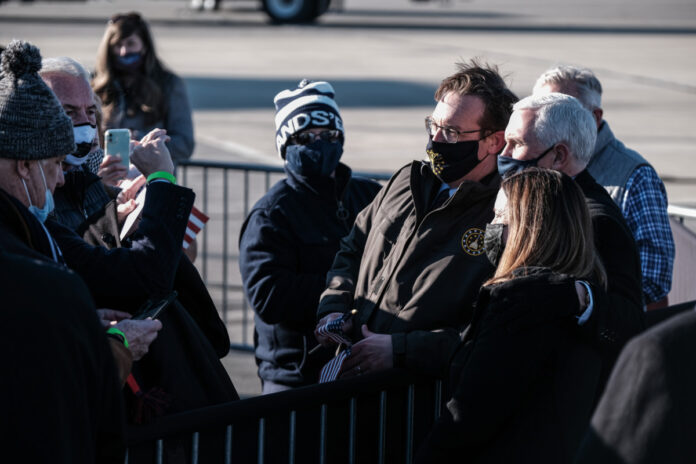
COLUMBUS, Ind. — Republican leaders in Bartholomew County say there have been some “differences of opinion” on former President Donald Trump since the Jan. 6 Capitol insurrection, particularly related to Trump’s “rhetoric” toward Columbus native and former Vice President Mike Pence.
One difference involves Trump’s weeks-long effort to pressure Pence to use powers he did not have to overturn election results in a handful of battleground states the former president lost in the 2020 election, said Bartholomew County Republican Party chair Barb Hackman, who announced this week that she would step down as chair in March.
On Jan. 6, Pence presided over a joint session of Congress to officially tally Electoral College votes and certify President Joe Biden’s victory.
Under normal circumstances, the vote-tallying procedure would have been a mere formality, The Associated Press reported. But after losing court case after court case, and with no further options at hand, Trump and his allies zeroed in on the congressional tally as their last chance to try to challenge the race’s outcome.
In a bizarre interpretation of the law, they argued that the vice president had the unilateral power to reject Electoral College votes supporting President Joe Biden. The Constitution makes clear that only Congress has that power.
Before the riot, Trump took the stage on Jan. 6 in front of thousands of supporters at a rally just south of the White House, falsely telling them, “If Mike Pence does the right thing, we win the election” before urging the crowd to “fight like hell.”
As Trump spoke, Pence released a letter to Congress stating that a vice president does not have “unilateral authority” to reject states’ electoral votes and later presided over the joint session that would officially certify his and Trump’s defeat.
Not long after that, a violent mob of Trump supporters outside the Capitol overwhelmed police, smashed windows and forced their way inside the building, temporarily halting the electoral proceedings and resulting in five deaths.
Pence, as well as his wife and daughter, were whisked away by security minutes before rioters entered the Senate chamber, many of whom seen on video chanting “Hang Mike Pence” and beating police with pipes and flag poles as they pressed inside the building, according to wire reports.
Trump did not call to check on Pence’s safety during the ordeal, instead tweeting, “Mike Pence didn’t have the courage to do what should have been done to protect our Country and our Constitution.”
After the insurrection, Pence returned to read the results of the electoral college certification in the early hours of Jan. 7, certifying Biden and Vice President Kamala Harris as the winners of the election.
Allies of Pence say it was an upsetting ordeal that put the vice president’s life in danger after years of unwavering loyalty to the president.
But Pence’s decision to defy the president also alienated some Trump supporters.
Hackman said while there are “strong Trump supporters” in Bartholomew County, “there could be a lot of hurt” among some local Republicans, especially because Pence is from Columbus.
“All the support and loyalty that Mike showed the president and then for him to do that has really upset a lot of local Republicans,” Hackman said. “And there have been some local Republicans that are upset that Mike didn’t go along with what Trump was wanting him to do. So there might be some differences of opinion, but it will not cause any rift, I don’t believe, going forward with the Republican Party.”
The “differences of opinion” come as Republican officials across the country confront profound questions about what the GOP stands for in the wake of the Capitol riot and with Trump out of office.
Over the past four years, the GOP’s values were inexorably tied to the whims of a president who regularly sought to undermine democratic institutions and traded the party’s long-standing commitment to fiscal discipline, strong foreign policy and the rule of law for a brash and inconsistent populism, according to wire reports.
The party now faces a decision about whether to keep moving in that direction, as legions of Trump’s most loyal supporters demand, or chart a new course.
The division right now among Republicans, at least at the national level, is “so deep and polarizing,” GOP pollster Frank Luntz told NPR last week, that “I don’t know how to fix it.”
Hundreds of Republican voters in some states, including Iowa and Pennsylvania, changed their party registration to independent or Democrat in the two days after the attack on the Capitol, according to wire reports
While the party switching is but a small fraction of the more than 74 million people who voted for Trump in November, they may offer an early warning of the volatility ahead for the GOP as the party braces for political fallout of the riots that many believe Trump incited, according to wire reports. House Speaker Nancy Pelosi is moving forward with impeachment against Trump even though he is out of office.
Locally, the Bartholomew County Democratic Party has received phone calls from voters since the Capitol riot, saying, ‘I’m not a Republican anymore. How do I become a Democrat?,” said Bartholomew County Democratic Party chair Steve Schoettmer.
In Indiana, voter registration is not done by party affiliation, and party registration isn’t always a good predictor how people will vote, especially with the next major national elections nearly two years away.
Schoettmer said he expects to see some people who are conservative by nature consider the Capitol riot “a bridge too far” and will opt not to support the Republican Party.
“I do believe there is some form of reckoning that’s going to happen,” Schoettmer said. “…As normality slowly starts to come back, I think people will look back on the (attempted) coup and go, ‘Well, I just can’t associate with that.’ And so I think you’re going to see a small movement (in local support).”
Some party leaders across the country are already concerned that long-lasting fallout is already starting to play out.
Multiple polls conducted after the Capitol riot show declining support for Trump among Republicans and Republican-leaning independents across the country and are increasingly divided on Trump and what role he should have in the party moving forward.
Trump’s approval rating among self-identified Republicans dropped to 70% after the Capitol riot, the lowest since he took office in January 2017, according to a Jan. 8-12 Reuters Ipsos poll. That is an 18% drop since mid-August and a 7% decline since the day before the riot.
Forty-three percent of Republicans and Republican-leaning independents said Trump should not continue to be a major political figure, according to a Jan. 8-12 poll by the Pew Research Center.
By contrast, 40% of Republicans said they would vote for Trump if he ran for president in 2024, according to a POLITICO/Morning Consult poll.
About 20% of Republicans said they “strongly” or “somewhat” approve of the Senate convicting Trump for incitement of insurrection, according to a Jan. 15-17 POLITICO/Morning Consult poll, up from 14% the week before.
Yet research by Luntz suggests that 43% of Republicans said they will definitely vote against any House Republican who supported impeaching Trump.
However, national polls may not reflect the views of Republicans in Bartholomew County.
Local Republican leaders said there are “strong Trump supporters” in the county, as well as support for the traditional GOP brand of limited government.
Indiana Rep. Ryan Lauer, R-Columbus, said he believes local Republicans remain “unified behind what President Trump and Vice President Pence stood for” and that the Capitol riot has not changed the local political landscape.
“I think the national media likes to focus on division, and I think the American people want to focus on our country and stay positive,” Lauer said. “I don’t see a fractionalization of the Republicans.”
Bartholomew County Clerk Jay Phelps, a Republican, said he has not noticed a dramatic split among local Republicans but acknowledged that some local party members do not support Trump.
Phelps said the party should focus on sharpening its messaging and improving outreach to younger generations of voters.
“I think that we need to have a clear message of what our party stands for,” Phelps said. “…There are all types of candidates in the Republican Party, as I’m sure there are on the Democrat side, with some policies they agree on and some policies they don’t. Some (local Republicans) like President Trump and some don’t. I think we can have some of these disagreements as a party. I think they could be healthy.”
Hackman said she does not believe any divisions among Republicans at the national level will impact whether Republicans in Bartholomew County rally behind local candidates and elected officials.
“What we’ll probably do is attend more to local politics and state politics,” Hackman said. “That’s still strong, Republican. I think on the national level, we’ll just have to wait and see what happens there. But locally, I don’t think it will affect us as much as it will nationally.”
Currently, it is unclear what path the Bartholomew County Republican Party will chart going forward, with GOP precinct and vice precinct committee members poised to select Hackman’s successor in March.
No candidates had thrown their hat into ring so far, Hackman said.
Local Democrats, for their part, remain optimistic that the fallout from the Capitol riot might slightly increase support for Democrats in a county they believe is “slowly moving” in their favor. But by how much, if at all, the political landscape shifts remains to be seen.
Schoettmer pointed to the Columbus City Council District 4 race in 2019, which Republican incumbent Frank Miller narrowly won by 40 votes over Democratic challenger Michael Schoumacher.
“If you were to rerun that election today, what would happen?” Schoettmer said. “There would definitely be movement. I just don’t know if it’s enough movement.”
— The Associated Press contributed to this report.




